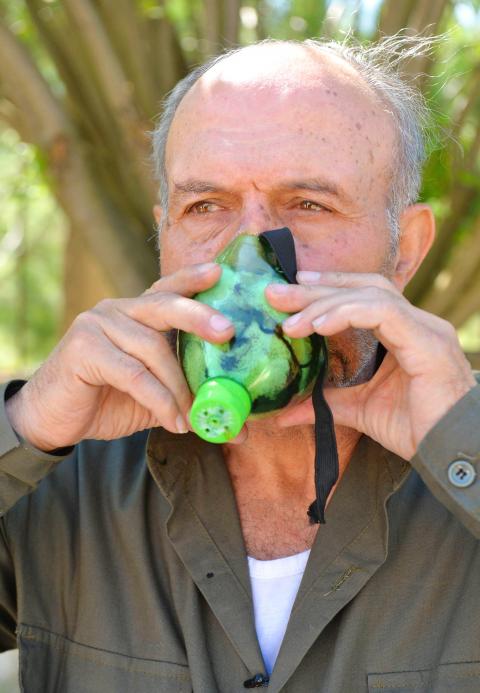US intelligence has found evidence that sarin gas, a chemical weapon, has been used in Syria on a small scale, the White House said on Thursday.
However, in a letter to the US Congress, the administration of US President Barack Obama said it did not believe the evidence was conclusive, saying it only had “varying amounts of confidence” in its reliability. Nor did the evidence prove beyond any doubt that the Syrian government had been responsible for using sarin, though this was “very likely” to be the case.
Later, US Secretary of State John Kerry said chemical weapons were believed to have been used in two separate attacks. If the evidence was confirmed, the White House said, “the United States and the international community have a number of responses available, and no option is off the table.”

Photo: AFP
“Our intelligence community does assess with varying degrees of confidence that the Syrian regime has used chemical weapons on a small scale ... specifically the chemical agent sarin,” the White House letter to Senators John McCain and Carl Levin said. “This assessment is based in part on physiological samples. Our standard of evidence must build on these intelligence assessments as we seek to establish credible and corroborated facts.”
The letter said the “chain of custody [paper trail]” by which the samples were thought to have made their way from Syria to the West, was “not clear, so we cannot confirm how the exposure occurred and under what conditions.”
“We do believe that any use of chemical weapons in Syria would very likely have originated with the [Syrian President Bashar] al-Assad regime. Thus far, we believe that the al-Assad regime maintains custody of these weapons, and has demonstrated a willingness to escalate its horrific use of violence against the Syrian people,” the letter said.
It was signed by Miguel Rodriguez, an assistant to Obama charged with managing relations with Congress.
US Secretary of Defense Chuck Hagel, who was in Abu Dhabi as part of a tour of the Middle East, said the US administration had reached its conclusion over the past 24 hours.
“As I’ve said, this is serious business — we need all the facts,” he said.
McCain, who has long advocated US-led military intervention in Syria, said the letter showed that the “red line” had been crossed. The wording of the letter suggested the administration was not ready to make that assessment. However, it did bring US assessments more in line with British, French and Israeli claims.
The careful use of language and the phrase “varying degrees of confidence” suggests that there remain disagreements among the various US intelligence agencies over the strength of the evidence and that the administration was seeking to keep its options open on whether and how to respond.
Obama has said the al-Assad regime’s use of chemical weapons would be a “game changer” that could trigger a US military response.
Yesterday’s letter restated that position.
“However, precisely because the president takes this issue so seriously, we have an obligation to fully investigate any and all evidence of chemical weapons use within Syria,” it said, repeating calls for a UN investigation to “credibly evaluate the evidence and establish what took place.”
However, for now, US and European officials appear ready to wait for the results of a UN inquiry into claims and counterclaims by both the Syrian opposition and the al-Assad regime that the other had used such weapons. UN investigators are due to visit survivors of alleged chemical weapon attacks in refugee camps, and analyze soil samples taken by Western intelligence agencies.
US officials had been disparaging on Wednesday about the evidence for the use of chemical weapons. Their UK counterparts had insisted that the intelligence agencies of both countries shared the same analysis of the evidence, but that it had taken longer for it to filter through to official pronouncements from Washington.
“There was just a longer lag in the US, but as far as I know we are absolutely on the same page on this,” a British official said.

The Venezuelan government on Monday said that it would close its embassies in Norway and Australia, and open new ones in Burkina Faso and Zimbabwe in a restructuring of its foreign service, after weeks of growing tensions with the US. The closures are part of the “strategic reassignation of resources,” Venezueland President Nicolas Maduro’s government said in a statement, adding that consular services to Venezuelans in Norway and Australia would be provided by diplomatic missions, with details to be shared in the coming days. The Norwegian Ministry of Foreign Affairs said that it had received notice of the embassy closure, but no

A missing fingertip offers a clue to Mako Nishimura’s criminal past as one of Japan’s few female yakuza, but after clawing her way out of the underworld, she now spends her days helping other retired gangsters reintegrate into society. The multibillion-dollar yakuza organized crime network has long ruled over Japan’s drug rings, illicit gambling dens and sex trade. In the past few years, the empire has started to crumble as members have dwindled and laws targeting mafia are tightened. An intensifying police crackdown has shrunk yakuza forces nationwide, with their numbers dipping below 20,000 last year for the first time since records

EXTRADITION FEARS: The legislative changes come five years after a treaty was suspended in response to the territory’s crackdown on democracy advocates Exiled Hong Kong dissidents said they fear UK government plans to restart some extraditions with the territory could put them in greater danger, adding that Hong Kong authorities would use any pretext to pursue them. An amendment to UK extradition laws was passed on Tuesday. It came more than five years after the UK and several other countries suspended extradition treaties with Hong Kong in response to a government crackdown on the democracy movement and its imposition of a National Security Law. The British Home Office said that the suspension of the treaty made all extraditions with Hong Kong impossible “even if

Former Japanese prime minister Tomiichi Murayama, best known for making a statement apologizing over World War II, died yesterday aged 101, officials said. Murayama in 1995 expressed “deep remorse” over the country’s atrocities in Asia. The statement became a benchmark for Tokyo’s subsequent apologies over World War II. “Tomiichi Murayama, the father of Japanese politics, passed away today at 11:28am at a hospital in Oita City at the age of 101,” Social Democratic Party Chairwoman Mizuho Fukushima said. Party Secretary-General Hiroyuki Takano said he had been informed that the former prime minister died of old age. In the landmark statement in August 1995, Murayama said